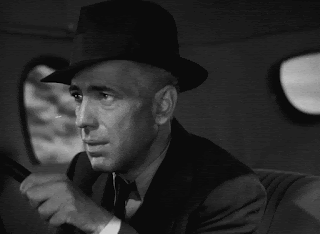I've said it before and I'll say it again, watching old movies makes you aware that there didn't used to be such rigid thematic classifications. Which is to say, it's much harder to classify some old movies. Is it an old fashioned, 30's style gangster flick? Is it an early Film Noir? Is i66v7ht a rather schmaltzy Capra-esque melodrama, a love story, a preachy political film siding with the downtrodden? Yes. Yes it is. It's also a film that came out in 1941 alongside The Maltese Falcon that made Bogart a star (which he wasn't when it was made, as you can see from the poster above, where Ida Lupino is billed above him, as she also is in the credits). I picked this because I needed a shot of Bogart to make up for Dick Powell's tepid turn as Marlowe, and this does not disappoint. It is also boosted by an excellent performance by Lupino (who is also great in On Dangerous Ground, and as the director of The Hitch-Hiker) playing a moll with a gritty past who falls hard for Bogart's Roy "Mad Dog" Earle and goes on the lam with him. The film begins with Earle, who is compared with Dillinger (who is quoted as saying that men like him are "rushing towards death") being sprung from prison in Indiana despite being on a life sentence for armed robbery, and immediately showing up to an apartment to get his marching orders for his next job. He doesn't like that his old friend Mac, who paid to have him sprung, isn't there, and instead there is an ex-cop, for whom Roy cannot hide his disdain. (Earle and this film appear to share a hearty dislike of the police.) But he takes the instructions, and, pausing only to visit his old family farm and instruct a local lad on the best fishing pond, he sets off for the West, to a skiing resort near the titular California mountain range, where the job is to happen. On the way he nearly gets into an accident with a truck driven by the instantly recognizable Henry Travers ("Pa"), who was the angel in It's a Wonderful Life. He's lost his farm too, and is taking his wife and their granddaughter out to LA to live with their daughter and her new husband. Roy takes a shine to them, and the granddaughter Velma in particular, and helps them out of various scrapes intermittently, including paying to have Velma's club foot operated on. Meanwhile, he arrives at the resort to find that his assistants are a couple of inexperienced punk hot heads ("Red" and "Babe") and the moll they brought along (Lupino's Marie). He wants to ship her back to LA because he sees that she is the cause of fights between the two punks, but she persuades him to let her stay. He begins to soften to her, and also to the mongrel dog "Pard" who hangs around, whom the camp dogsbody (a rather Step n Fetchit performance by the pop-eyed Willie Best) informs him is bad luck, because his last three owners died. Eventually we see Velma's true colors: after she is no longer a "cripple" she vows to enjoy life and turns down Roy's offer of marriage in favor of loyalty to her no-good divorcé boyfriend from back home. We also see the true colors of the gang's "inside man" at the resort, "Mendoza" who begs to be brought along after the heist goes bad and a security guard gets shot. The gang split into two cars, but the one carrying Red, Babe and Mendoza takes a wrong turn and crashes, and bursts into flames. Marie and Roy and Pard proceed to LA, but Mac, whom Roy has been working with in LA, has died, and the ex-cop decides that he and Roy should change plans and just split the loot. Roy rejects him and a gunfight ensues. This leaves a wounded Roy with a box full of jewels and the need to find a fence, as Mac was going to buy the jewels off him before. Meanwhile, Mendoza is the lone survivor of the crash and has grassed up Roy (and Marie and Pard) so they're fugitives. And the rest of the movie is Roy "parking" Marie and Pard on a bus to Las Vegas and attempting to find a fence and then running for the mountains.
The climax of the movie is famous: Bogart hiding out behind rocks on a steep mountain slope with a machine gun shouting "come and get me, coppers!" to the massed blue ranks below. It ends tragically, of course, although Marie clutches to the fact that Roy has "crashed out" (found freedom). So there you have it: unless you're looking for comedy or horror, this movie has something for everyone. And Bogart and Lupino make an affecting couple.
Friday, December 20, 2019
Subscribe to:
Post Comments (Atom)





No comments:
Post a Comment